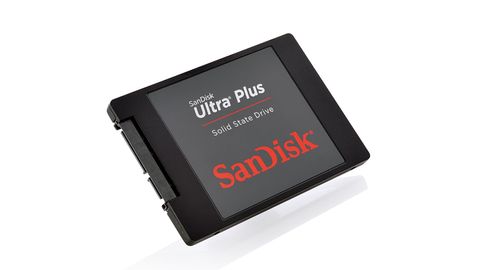TechRadar Verdict
Pros
- +
Good price per GB
- +
Solid but not stellar performance
- +
Impressive 4K random result
Cons
- -
Write speed could be better
Why you can trust TechRadar
The SSD market is one of the most vibrant sectors of the PC components arena for the simple reason that it's still young and hasn't yet divided into a few key players. In processors there's Intel and AMD and in graphics AMD and Nvidia - though Intel might make some in-roads into that dominance with Haswell.
In the SSD market there are so many manufacturers, offering so many drives, that the choice is simply vast and a little overwhelming too. It also means you get drives coming in from left field that turn out to be rather special.
SanDisk is one such company and the Ultra Plus one such SSD. SanDisk is a big name in general storage, with flash drives and SD cards aplenty, but it's not known for its solid-state drives. Its previous old Extreme series SSDs were relatively well-received, despite their reliance on a SandForce controller, but this Ultra Plus drive eschews that ageing silicon for the more recent Marvell 88SS9175 and also pairs it with SanDisk's own 19nm NAND flash chips.
Being able to use it's own memory chips means that SanDisk can price its new drives aggressively and this 256GB Ultra Plus is sitting at the 51p per GB mark. It also uses the less feature-packed of Marvell's controllers, with only four NAND channels as opposed to the traditional eight. That's not an issue here as there are only four 64GB chips on the tiny PCB inside that package. This all keeps cost and power draw down, and there are rumours you'll find these diminutive SSDs jammed into a good few Ultrabooks very soon too.
In terms of performance the headline sequential read/write figures aren't that stellar, while still improved over the weak incompressible performance of the SandForce controller. The read speed is decent: clocking in around 450MB/s, but the write speed is languishing down around 386MB/s. That's slow in comparison with some of the OCZ and Corsair drives we've seen recently, but quicker than the non-Pro version of Samsung's 840 series drive.
That's important because the Samsung 840 250GB drive is retailing for the same price as this SanDisk, and with 6GB less space.
Benchmarks
Sequential read performance
AS SSD: Megabytes per second: Higher is better
SANDISK ULTRA PLUS 256GB: 453
SAMSUNG 840 250GB: 517
OCZ VECTOR 256GB: 514
Sequential write performance
AS SSD: Megabytes per second: Higher is better
SANDISK ULTRA PLUS 256GB: 386
SAMSUNG 840 250GB: 243
OCZ VECTOR 256GB: 494
4K random write performance
AS SSD: Megabytes per second: Higher is better
SANDISK ULTRA PLUS 256GB: 57
SAMSUNG 840 250GB: 47
OCZ VECTOR 256GB: 74
Mmm… cache
The Ultra Plus, however, impresses in the 4K random read/write results and posts the fastest read speeds we've seen and is pushing on for 60MB/s on the writes.
SanDisk has made random read/write performance a real focus, going back a good few years now, with its nCache software. This configures some of the flash memory into a hybrid SLC mode sending small files to that higher performance area. Then, when the drive is idle, the garbage collection routines fire those files into the slower MLC portion of the drive. It's also got a 128MB dedicated cache chip, which should also help performance.
For such a quick drive, which is incredibly responsive on the desktop, to be on the market at 51p per GB is fantastic - and if you can't afford to push the boat out for either the OCZ Vertex 4 or Vector drives then the SanDisk Ultra Plus will not disappoint.

